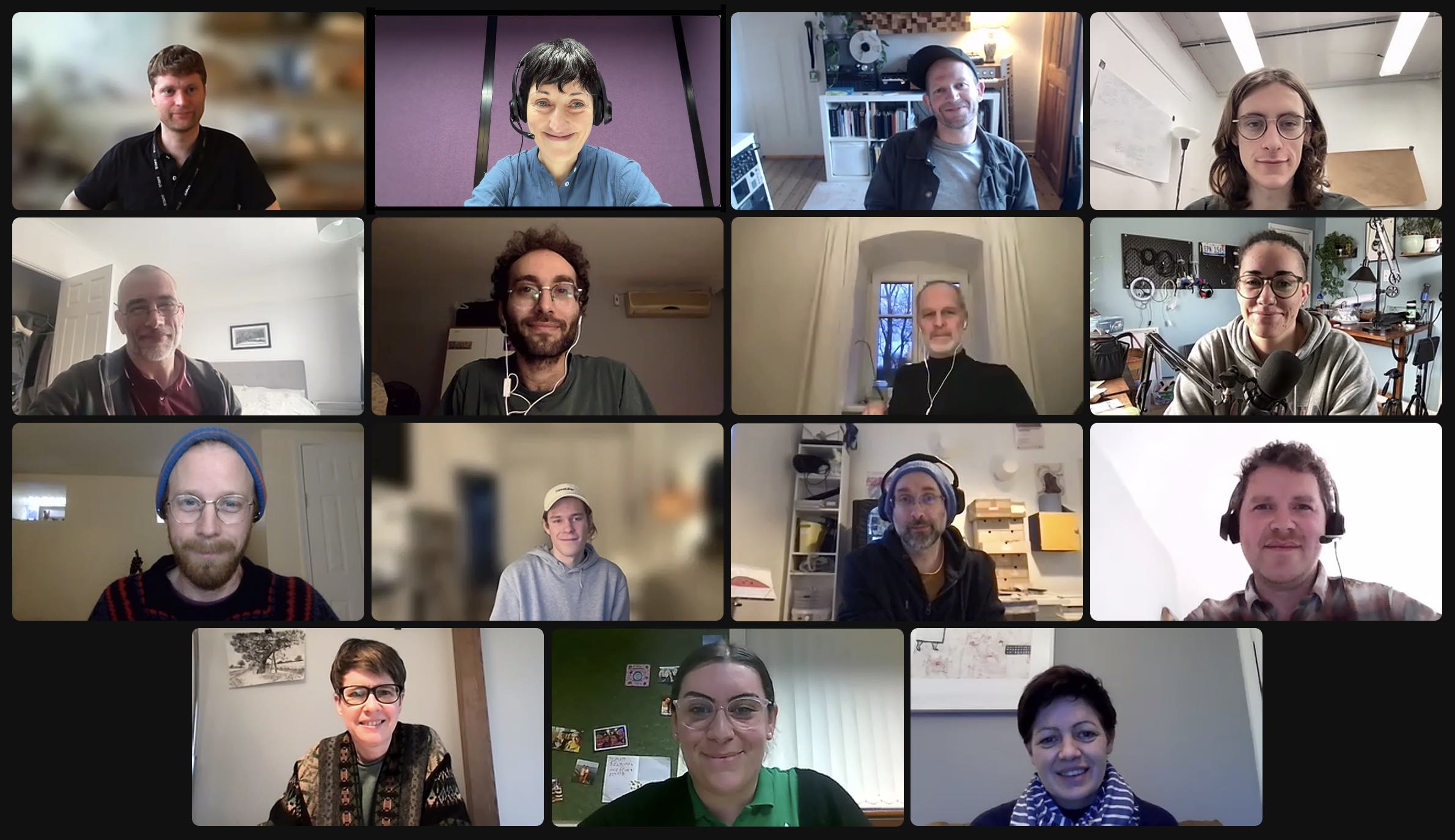Summer School Online Session 1
Photo: From left-right top-down, Mike Bell, Anna Xambó, Ed Chivers, Miles Scharff, Peter Batchelor, Bardia Hafizi, Florian Goeschke, Gabrielle Cerberville, Austin Blanton, Jordan Juras, Luigi Marino, Nick Wardlaw, Kate Anderson, Danielle Grimsey, and Hazel Stone.
With apologies from Amira and Anne Marie, on Thursday 15th February 2024, we kicked off the awaited summer school online sessions, where we made short introductions and shared initial project ideas and interests.
First, we started the session by introducing ourselves in a quick round where we were invited to give our name, our favourite sound, our role and our expertise, to then pick the next person. We found out that a ‘favourite sound’ can vary over time and some of the preferred sounds were linked to childhood. The selected favourite sounds ranged from the clicking of a pantry door, the sound of metals, laser edging over metals, the crackling sound of lighting cedar branches on fire, the droning of tyres, cat’s purring, walking with a bottle of water and a coffee, cicadas, the sound of a Japanese design object/instrument for gardens, pigeons landing on the roof’s tiles, sailing boat masts and the stays tapping against them, children laughing having fun playing vs peaceful silence, and raindrops under an umbrella, among others. The songs “Here Comes the Sun” by the Beatles and “Heavy Metal Drummer” by Wilco were also mentioned as favourite songs.
Second, we presented the Sensing the Forest project and the summer school expectations. We outlined the connection of the summer school with the first artistic intervention of the project: an artistic audio ecology intervention concerning forests and climate data in Alice Holt (Hampshire, UK) in collaboration with Forest Research and Forestry England. Luigi gave updates on the audio streamboxes, which will be essential for this intervention (see Luigi’s blog post Phase 1 - Setting up the streamers). Pete gave an overview of the multichannel installation, which will be an entirely acoustic intervention using suspended speakers that will be distributed in some way and will be sonifying climate data. Within the project, we placed the summer school as an invitation to artists and makers to explore how can artistic interventions raise awareness about the place, the data, and climate change.
Finally, we heard from the summer school attendees about their initial artistic ideas and propositions. This spanned from dance and the concept of body as territory; augmented reality/embodied experiences and sound sculptures; inter-species communication and playfulness; portable music inspired by the surroundings and biosignals; forest found objects and mechanical woodpeckers; electromagnetic radiations and invisible ecologies; observational drawing on how humans connect to nature; interactive immersiveness beyond the human species; and healing sonic rituals as a way to sense ecological landscapes.
Thanks all for your participation! It was a blast! The next session will be on February 29, 2024. Nick Wardlaw (Forestry England) and Michael Bell (Forest Research) will introduce the site of Alice Holt forest.
The slides of the session are available here.
Final note
We had an excellent response to the open call, receiving 28 applications overall. The review committee was impressed with the high quality of all the submissions and had difficulty in making final decisions. We thank all the applicants for their proposals and we have offered them an alternative route so that everybody can still be part of the summer school considering our limited funding and resource capacity: we have offerered access to the video recordings of the lectures and the opportunity to develop an independent project using the Alice Holt environmental data that can be showcased as part of the 1-year online exhibition.
